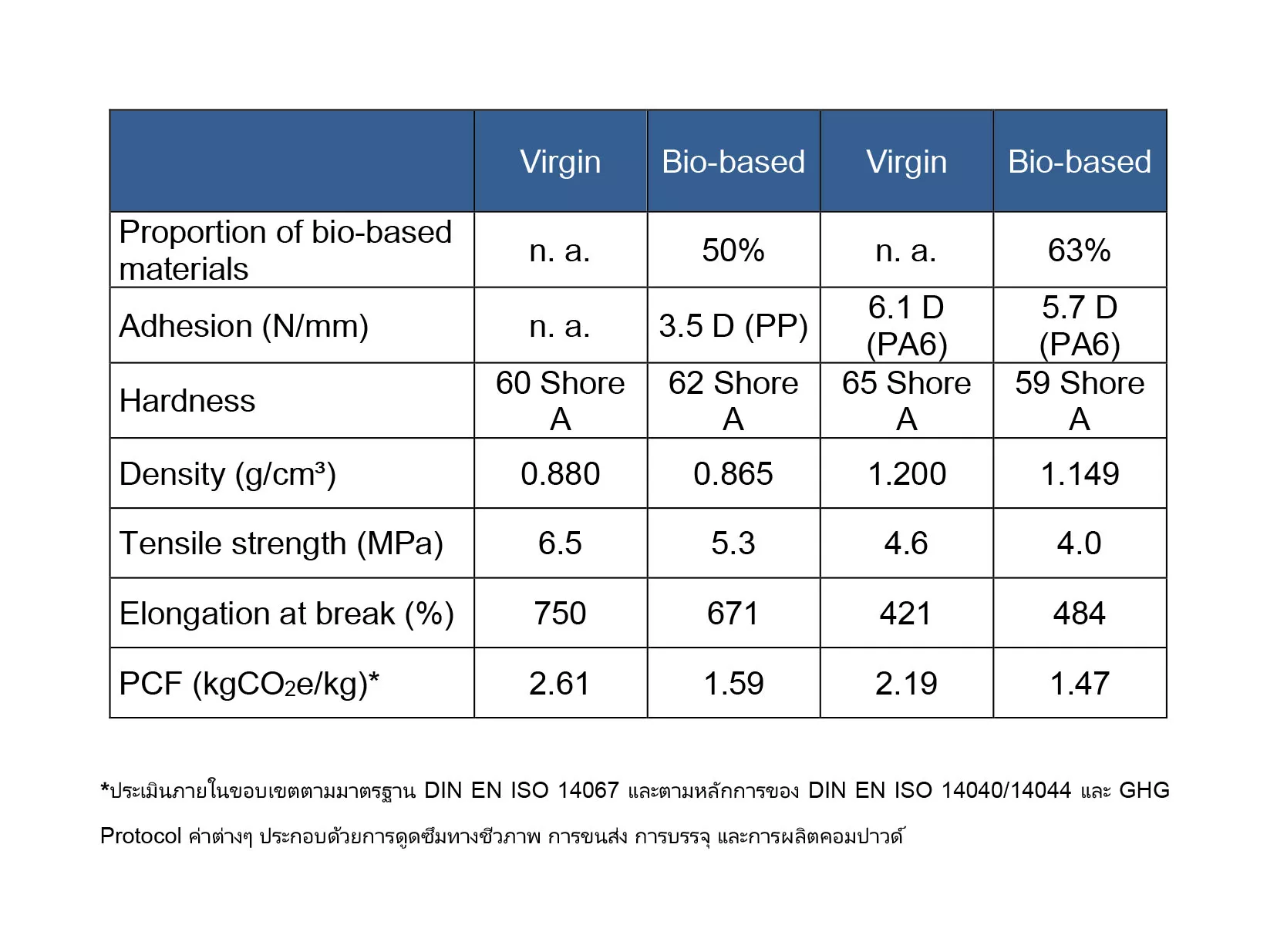ใหม่และมีจำหน่ายทั่วโลก: TPE ชีวภาพ
TPE ใหม่จากแหล่งวัตถุดิบหมุนเวียนพร้อมปริมาณคาร์บอนฟุตพริ้นท์ของผลิตภัณฑ์ที่ลดลง
KRAIBURG TPE ตอบสนองต่อปัญหาของวัสดุชีวภาพโดยการจัดหา TPE ชีวภาพด้วยสัดส่วนวัตถุดิบที่ยั่งยืนที่ผันแปรได้
KRAIBURG TPE กำลังนำเสนอเทอร์โมพลาสติกอีลาสโตเมอร์ (TPEs) ที่มีสัดส่วนวัตถุดิบที่หมุนเวียนได้หลากหลาย ด้วยการแนะนำสารประกอบใหม่เหล่านี้ ผู้ผลิต TPE ระดับโลกกำลังขยายกลุ่มผลิตภัณฑ์ THERMOLAST®R ที่ยั่งยืนมากขึ้นด้วยการเพิ่มกลุ่มผลิตภัณฑ์จากแหล่งวัตถุดิบที่หมุนเวียนได้ TPE ชีวภาพยังมีการปล่อยก๊าซคาร์บอนของผลิตภัณฑ์ต่ำกว่าทางเลือกอื่นที่ไม่ได้ใช้วัตถุดิบหมุนเวียน

ด้วย TPE ชีวภาพ เรากำลังเติมเต็มช่องว่างในผลงานของเรา และก้าวไปอีกขั้นสู่ TPE ที่ยั่งยืนมากขึ้น TPE ชีวภาพของเรามอบโซลูชันที่ยั่งยืนมากขึ้น ขณะเดียวกันก็รักษาประสิทธิภาพตามปกติและลดการปล่อยก๊าซคาร์บอนของผลิตภัณฑ์
Dr. Tobias Brückner | Project Manager Advance Development at KRAIBURG TPE
Waldkraiburg, 17 ตุลาคม 2566 – ความยั่งยืนเป็นส่วนสำคัญของขั้นตอนการออกแบบ เมื่อแนวคิดเรื่องความยั่งยืนมีบทบาทสำคัญในตั้งแต่เริ่มต้นโครงการเท่านั้นจึงจะสามารถมีส่วนช่วยให้โครงการประสบความสำเร็จในระยะยาวได้ ลูกค้าของ KRAIBURG TPE สามารถเข้าถึงสารประกอบที่ยั่งยืนมากขึ้นซึ่งมีสัดส่วนของวัสดุรีไซเคิลหลังการใช้งานในอุตสาหกรรมหรือหลังการใช้งานของผู้บริโภค โดยเฉพาะอย่างยิ่งในภาคผู้บริโภคและยานยนต์ ขณะนี้ KRAIBURG TPE กำลังเสริมโซลูชันที่ยั่งยืนมากขึ้นโดยการเพิ่ม TPE ชีวภาพที่ทำจากวัตถุดิบที่รองรับการเปลี่ยนจากสารประกอบที่ใช้ทรัพยากรฟอสซิลไปเป็นผลิตภัณฑ์ทางเลือกที่ใช้วัสดุหมุนเวียน และทำให้การเปลี่ยนแปลงนี้น่าสนใจ
ในการประเมินวัตถุดิบใหม่สำหรับ TPE จากชีวภาพ KRAIBURG TPE มุ่งเน้นไปที่วัสดุที่ไม่ได้ใช้สำหรับการผลิตอาหาร สิ่งเหล่านี้เป็นวัตถุดิบ เช่น ผลพลอยได้ทางการเกษตรหรือวัสดุเหลือใช้จากการผลิตอาหารที่ไม่สามารถนำไปใช้เป็นอาหารได้แม้ว่าจะผ่านกระบวนการแปรรูปเพิ่มเติมก็ตาม KRAIBURG TPE ประเมินแหล่งที่มาของวัตถุดิบอย่างมีวิจารณญาณ เพื่อตอบสนองความต้องการที่สูงของบริษัท ด้วยการทำงานอย่างใกล้ชิดกับซัพพลายเออร์ KRAIBURG TPE ช่วยให้มั่นใจในความสามารถในการจัดส่งสำหรับวัตถุดิบชีวภาพและวัตถุดิบรีไซเคิลที่เทียบเคียงได้กับโพลีเมอร์พื้นฐานทั่วไป
การใช้ TPE ชีวภาพสามารถลดการปล่อยก๊าซคาร์บอนไดออกไซด์ (PCF) ของผลิตภัณฑ์ได้สูงสุดถึง 50 เปอร์เซ็นต์ เมื่อเทียบกับ TPE ที่ทำจากวัสดุจากฟอสซิล PCF หมายถึงปริมาณการปล่อยก๊าซเรือนกระจกทั้งหมด โดยเฉพาะก๊าซคาร์บอนไดออกไซด์ (CO2) ที่เกี่ยวข้องกับการผลิต การใช้งาน และการกำจัดผลิตภัณฑ์หรือบริการนั้นๆ ความโปร่งใสและความเข้าใจ PCF สามารถช่วยให้ลูกค้าปลายทางและบริษัทแปรรูปสามารถตัดสินใจโดยใช้ข้อมูลรอบด้านเมื่อเลือกวัสดุเพื่อผลิตและทำการตลาดผลิตภัณฑ์ที่ยั่งยืนมากขึ้น ประเด็นนี้เป็นที่สนใจในปัจจุบันในทุกตลาดที่มีความต้องการวัสดุที่มีการปล่อยก๊าซคาร์บอนลดลง ด้วยการใช้วัตถุดิบหมุนเวียนในการผลิต TPE ชีวภาพ KRAIBURG TPE กำลังช่วยเหลือลูกค้าอย่างแข็งขันให้บรรลุเป้าหมายด้านความยั่งยืน
TPE ชีวภาพให้กลิ่น สัมผัส การยึดเกาะ และการยึดเกาะที่เป็นกลาง ซึ่งเทียบเคียงได้กับ TPE ที่ทำจากฟอสซิลในระดับสูง ผลิตภัณฑ์ใหม่ประกอบด้วยโซลูชั่นต่างๆ เช่น สารประกอบที่มีการยึดเกาะกับ PP, ABS/PC และ PA ภายในช่วงความแข็งระหว่าง 30 ถึง 85 Shore A สารประกอบแต่ละชนิดมีปริมาณทางชีวภาพมากกว่า 60% สารประกอบทั้งสองที่มีการยึดเกาะกับ PP และวัสดุมีขั้วสามารถทำสีได้ วัสดุดังกล่าวได้รับการทดสอบอย่างละเอียดในการฉีดขึ้นรูปและการอัดขึ้นรูป และมีคุณสมบัติในการประมวลผลเทียบเท่ากับ TPE ที่ทำจากฟอสซิล
“ด้วย TPE ชีวภาพ เรากำลังเติมเต็มช่องว่างในผลงานของเรา และก้าวไปอีกขั้นสู่ TPE ที่ยั่งยืนมากขึ้น TPE ชีวภาพของเรามอบโซลูชันที่ยั่งยืนมากขึ้น ขณะเดียวกันก็รักษาประสิทธิภาพตามปกติและลดการปล่อยก๊าซคาร์บอนของผลิตภัณฑ์ เรากำลังรอคอยโครงการที่ช่วยให้เราสามารถเปลี่ยนจากวัตถุดิบจากฟอสซิลไปเป็นวัตถุดิบที่ยั่งยืนมากขึ้น” Tobias Brückner ผู้จัดการโครงการ Advance Development ของ KRAIBURG TPE กล่าวสรุป
ปัจจุบัน TPE ชีวภาพผลิตในประเทศเยอรมนี และมีจำหน่ายทั่วโลกทันที
- Traceable bio-based/biogenic carbon content according to ASTM D 6866
- Adhesion to Polyolefins, PC, ABS, PC/ABS or PA
Christina Havlicek
Market Manager Consumer at KRAIBURG TPE

Phone: +49 8638 9810-293
Mobile: +49 162 7651755
E-Mail: christina.havlicek@kraiburg-tpe.com
New and available worldwide: Bio-based TPE
TPEs from renewable raw material sources with a lower product carbon footprint.
KRAIBURG TPE responds to the issue of bio-based materials by supplying bio-based TPEs with a variable proportion of sustainable raw materials.
KRAIBURG TPE is presenting thermoplastic elastomers (TPEs) that have a variable proportion of renewable raw materials. By introducing these new compounds, the global TPE manufacturer is expanding its THERMOLAST®R range of more sustainable solutions by adding a line of products from renewable raw material sources. Bio-based TPEs also have a lower product carbon footprint than established alternatives that are not based on renewable raw materials.
Waldkraiburg, 17 October 2023 – Sustainability is a key aspect of the design phase. It is only when the idea of sustainability plays a major role from the very start of a project that it can contribute to the project’s success in the longer term. KRAIBURG TPE’s customers already have access to more sustainable compounds that contain proportions of post-industrial or post-consumer recycled materials, particularly in the consumer and automotive sectors. KRAIBURG TPE is now complementing its range of more sustainable solutions by adding bio-based TPEs made of raw materials that support the transition from compounds based on fossil resources to alternative products based on renewable materials and make this transition attractive.
When evaluating new raw materials for bio-based TPEs, KRAIBURG TPE is focusing on materials that are not used for food production. These are raw materials such as agricultural by-products or waste materials from food production that cannot be used as food even if they are further processed. KRAIBURG TPE critically evaluates the origin of raw materials in order to meet the company’s high self-imposed requirements. By working closely with suppliers, KRAIBURG TPE ensures a delivery capability for bio-based and recycled raw materials comparable to that for conventional base polymers.
Using bio-based TPEs can reduce a product’s carbon footprint (PCF) by up to 50 percent as compared to TPEs made of fossil-based materials. PCF refers to the total amount of greenhouse gas emissions, particularly carbon dioxide (CO2), associated with the production, usage and disposal of a particular product or service. Transparency and understanding the PCF can enable end customers and processing companies to make informed decisions when selecting materials in order to produce and market more sustainable products. This aspect is currently of interest in all markets where there’s a demand for materials with reduced carbon footprints. By using renewable raw materials in the production of bio-based TPEs, KRAIBURG TPE is actively helping customers to achieve their sustainability targets.
Bio-based TPEs provide neutral odor, touch, grip and adhesion properties that are highly comparable to those of fossil-based TPEs. The new products include solutions such as compounds with adhesion to PP, ABS/PC and PA within a hardness range between 30 and 85 Shore A. Individual compounds have a bio-content of more than 60%. Both compounds with adhesion to PP and to polar materials can be colored. The materials have been thoroughly tested in injection molding and extrusion and have processing properties comparable to those of fossil-based TPEs.
“With bio-based TPEs, we are filling a gap in our portfolio and taking another step toward more sustainable TPEs. Our bio-based TPEs provide more sustainable solutions, while maintaining the usual performance and reducing the product carbon footprint. We are looking forward to projects that enable us to make the transition from fossil-based to more sustainable raw materials,” sums up Dr. Tobias Brückner, Project Manager Advance Development at KRAIBURG TPE.
Bio-based TPEs are currently produced in Germany and are available worldwide immediately.
KRAIBURG TPE Quick Facts
- Founded in 2001 as an independent business unit of the KRAIBURG Group
- HQ & Production Site: Waldkraiburg / Germany
- Regional HQ & Production site: Kuala Lumpur / Malaysia, Atlanta / USA
- Products: Thermoplastic Elastomer Compounds
- Brands: THERMOLAST®, COPEC®, HIPEX®, and For Tec E®
- Markets: EMEA, APAC, Americas
- Employees: 660







